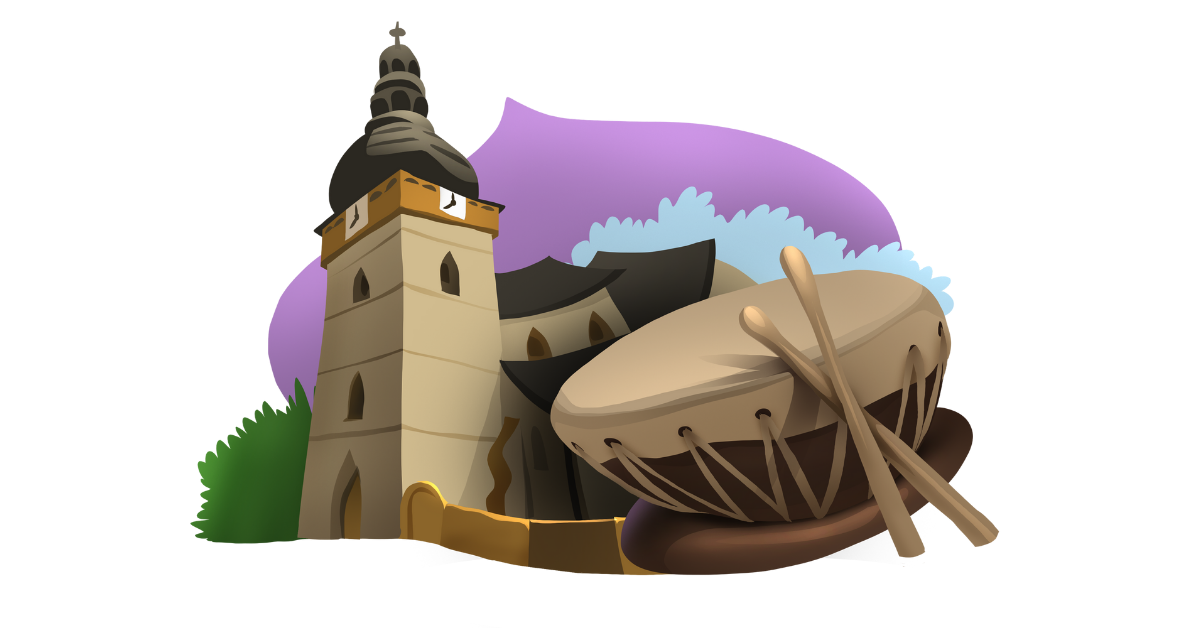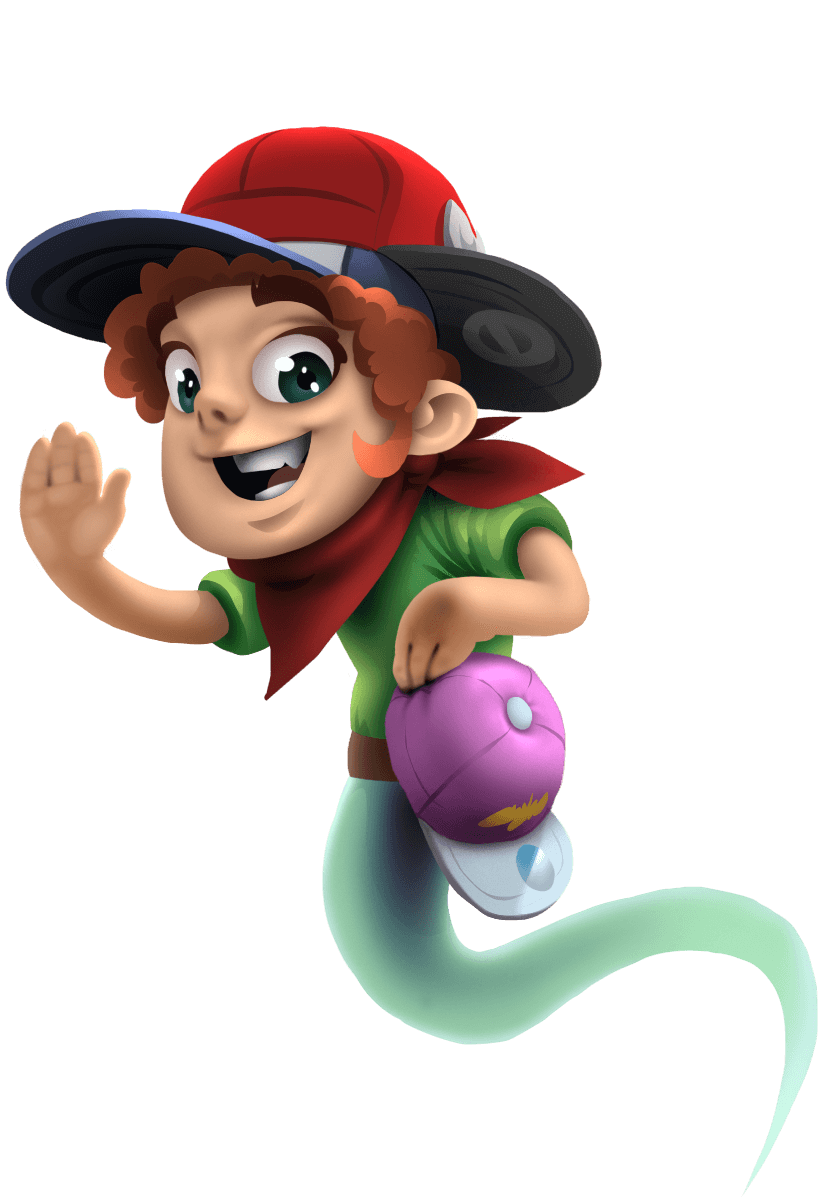

Kaško, the ghost of the country of Haravara, was hanging, wagging his tail, and rolling his smouldering eyes towards the window in the air outside the window. From behind him came music that must have made even the dead dance. Arab drums, tambourines, and shakers. And Majka, who was spinning around, intertwining her arms, stamping her feet, and laughing. Kaško was watching what Majka was doing and slowly joined her outside the window. And suddenly Majka's face changed. The smile disappeared and a kind of anger appeared in her. The music stopped, Majka sat down on the ground and Maxík said something in her ear.
Kaško flew through the window and into his friends' room.
"I'll never learn this!" was the first thing he heard from Majka.
"Kaško, tell her that's not true," winked Maxík at Kaško, "but she'll learn if she works hard!"
"Well, I'm sure she will, but what does he want to learn?" Kaško exclaimed incomprehensively.
"Maxík learned to play beautiful Arabic songs and I wanted to learn Arabic dances." Majka began.
"So, ...?" Kaško still didn't understand.
"Well, I don't know them!"
"But you do!" Maxík countered.
"I know, I know, but only this little."
Majka started stamping her feet beautifully, then she added her hands, which seemed to be drawing butterflies and little birds in the air, and then she started twirling her skirt and...
"And I don't know this!" Majka stamped. "Can you see it?"
"But it was nice before."
"But I would like to be able to dance like Turkish dancers do."
"Go on, learn it." Kaško blurted out.
"But where?" Majka whimpered.
"Where, where? In Turkey." Kaško said calmly, as if he was talking about a trip to Trebišov.
"Are you being serious?" Maxík looked over the edge of the Turkish drum.
"Absolutely." Kaško answered calmly.
Majka and Maxík looked at their flying friend in puzzlement. Kaško's laughter broke the silence.
"Well, if you could see yourself. You looked like mice just ploughed up." Kaško thumped his ghostly tail.
"Excuse me, like mice?" Majka was offended.
"Good, good. Listen," Kaško called his friends closer to him, "part of the Haravara country used to belong to Turkey."
"What?" Majka whispered.
"Well, yes. And that part was near Košice. There was one of the centres of Turkey in Štítnik. And there's a place there, a church, in which mysterious invisible frescoes are hidden. We can use them to bring the Turkish ghosts back to life. And they can teach you how to dance." Kaško turned to Majka, whose mouth was open with surprise so wide that 142 flies could have flown in.
"And you know how they can come alive?" Maxík asked.
"I don't know."
Majka's eyes now grew even bigger in surprise, in addition to her enlarged mouth, and she looked like a frog that had just woken up.
"We, ghosts, are rational beings. You must have noticed that. I don't remember how they come to life, but I know how we find out."
The children had only one question in their eyes - HOW?
Kaško just winked, gave the kids a common accelerator and they were off.
They landed in a small square in front of a big church and some shabby houses with beautiful facades.
"That's where we'll find the answers." Kaško pointed to the church.
"In the church?" Maxík murmured in amazement.
"This is no ordinary church. It has been standing here for over 600 years. First it was Catholic, then Protestant, and finally.... Look up there at the pinnacle." Kaško winked skyward.
The children looked up at the turret and almost fainted. On churches, there are usually crosses or roosters on the pinnacles, and here a crescent moon.
"What is it?" Majka asked, surprised.
"This is the crescent moon, the emblem of Islam, another religion. The Turks left it here when the border of the Turkish Empire was passing through here."
"You're not being serious!", Maxík blurted out, "so we're in Turkey now?"
"Of course, we are!" Kaško replied cheerfully and headed for the church. "There are old frescoes in the church...."
He noticed that the children probably didn't know what frescoes were, so he explained it to them.
"But these are paintings on the wall, which are made by a úeculiar technique of painting them into the wet plaster so that they become part of the wall." Kaško tried to explain as simply as possible.
"Oh," wondered the children, imagining if they had seen such a fresco somewhere before.
They walked into the church and were amazed. There were amazing paintings all over the walls. I mean, frescoes.
"Great!" Maxík whispered aloud, looking up at the ceiling, where the vault showed what looked like a giant spider, frescoes of knights, old Sibyls, bearded men looking like old wise men from fairy tales, horses, and ....
"But how does it read?" Kaško muttered under his nose, flying from wall to wall.
"What are you looking for?" Majka asked a little louder because Kaško had just flown around a beautiful massive pillar about 20 meters above her.
"Got it! The Seven Arts." Kaško cheerfully flew to one of the windows.
"What arts?" Maxík shook his head.
"Grammar, rhetoric, logic, arithmetic, geometry, astronomy, music." Kaško enumerated like a professor.
"And these are the arts?" Majka sat down on the nearest bench, tired and admiring the beautiful paintings on the walls.
"That's what they used to say. It was the stuff that had been taught in all the schools. They were things that every educated person, artist, should know. And now I must read them properly in a ghost-like way, so that what we want would happen, will happen indeed. Stand back."
Kaško stood on his tail in the middle of the church, facing the window around which were the Liberal Arts frescoes, closed his eyes, and began saying:
"Grastamataltista, retomotorostota, logomaramata, aritonumerototo, geometrumetroko, astronologo, muzikoritaverta"
He looked at the walls around the window to see that nothing was happening.
"Isn't it working?!" Kaško wondered.
"I knew I'd never learn that dance." Majka sighed.
"Wait.... I must have forgotten something." Kaško thought.
Maxík and Majka didn't disturb him and looked up at an object that was sticking out of the wall high above the entrance. Kaško looked in that direction.
"Yesssss!" Kaško exclaimed aloud forgetting he was staying in the church.
"Hushhh." Majka shouted back.
"One can't do it without music. There must be music to go with it. Maxík, pick the instruments and let's get to it."
"But I didn't take any. You said Majka was going to learn to dance!" Maxík rolled his eyes.
"Well, never mind," said Kaško, taking Maxík in his arms, "you play the organ."
"The organ?!" Maxík moaned.
"Boys, be careful!" Majka yelled fearfully when she saw Maxík and Kaško about 15 metres above the ground.
„ To je, ako hrať na klavíri, neboj sa..“ uisťoval ho Kaško.
"Sure." Maxík wanted to add something else, but he was already sitting at the organ, which was sticking out of the wall at a great height.
"Play!" Kaško challenged Maxík.
Maxík started a simple melody that had just occurred to him, and Kaško repeated his soul incantations:
"Grastamataltista, retomotorostota, logomaramata, aritonumerototo, geometrumetroko, astronologo, muzikoritaverta."
When he finished the last word, suddenly Maxík's playing was joined by eardrums from somewhere. They had a beautiful sound. The kind he had only heard in documentaries about faraway lands. There was a whistle and what sounded like a harp. Maxík played, silent and enjoying what was happening. He didn't know if it was a dream or reality. It didn't matter. It was beautiful. Not just pretty, but beautiful.
And that's when it happened. On one wall, where there were no frescoes, paintings of men in wide trousers and with turbans on their heads began to appear. Then women appeared in gorgeous billowing and colourful skirts, with transparent veils and something flashing around their waists. They were ever more visible. Suddenly the women began to dance, and Maxík noticed that the men had, besides the sword at their waists, drums, whistles, and some kind of stringed instruments in their hands. The hands were moving like on the TV.
When the big drum was hit, all the figures came out of the wall.
Majka jumped under the wooden bench and Maxík stopped playing and carefully ran down to his sister. Majka just stared at the beautiful girls coming out of the wall, dancing just the way she wanted to dance. Kaško ran over to a cheerful, dancing guy playing his drum so fast that his fingers couldn't even be seen.
"Emre!" Kaško exclaimed.
"Kaško!" exclaimed the jolly fellow, and they all stopped playing and dancing.
The two embraced each other, and Kaško whispered something in Emre's ear. They both laughed. Then the girls came to them. Kaško whispered something to them, too, and then exclaimed.
"Maxík, Majka, come out, they're friends."
Max and Majka came out of the benches and came closer to Kaško.
"This is Emre, my Turkish friend, with whom I spent the wonderful years of my studies in Hierapolis."
"What?!" Maxík almost fainted away, "you studied in Turkey?"
"Well, they have one of the oldest ghost schools and divination rooms in the world. My alma mater."
The children couldn't understand.
"Majka, this is Illayda, our way of saying water fairy." The prettiest dancer of them all bowed and laughed.
"Beautiful name." Majka whispered and bowed as well.
"After my studies, we met Emre again here more than 400 years ago when Turkey was here." Kaško recalled.
"And when the Turks withdrew after the lost battles, we liked it here and we stayed here, in Štítnik in the country of Haravara." Emre finished the story. "We live in a secret room behind this biggest pillar that no one knows about."
"I hear you want to learn to dance our dances." Illayda said to Majka.
"Yes, very much so, and especially those belly ones."
"Hmmm, but for that you need a scarf that will squeak and sparkle like that.
"I have a scarf." Majka started to get ready for her dance class.
"And hang some small stones from the ground on it," Maxík advised.
Both Illayda and Majka looked at him rather harshly, as only girls can when boys say something stupid.
"It should be sparkly, beautiful, small, there should be lots of them and ....." Illayda mused.
"I know how we'll get along!" Emre beamed, “you, girls, learn your steps and wiggle your hips while we bring something beautiful for Majka's scarf."
"Maxík, are you coming with us?"
"Sure," Maxík ran to Kaško and they immediately took off, "what would I do here. I'm sure those girls would still include me in their dancing."
"We're just going around the corner here!" Emre pointed.
And indeed, in a few moments they were standing by the cave.
"This is the Ochtinská Jaskyňa cave. Aragonite grows in it. A beautiful crystal. Very rare. It must not be broken or destroyed." Emre explained why they were here.
"But we do know the site from the abundance of aragonite fragments. When we find broken pieces of aragonite, we deposit it in a secret room in the cave where the cavers haven't gotten to yet." Kaško whispered in Maxík's ear.
They flew into the cave through a secret entrance in the rock under the moss, then flew in the dark. After a while, Max saw a beautiful light. When they came closer, he saw beautiful pieces of white crystals.
"Get them in this bag here. I'm sure Majka will like them." Emre smiled.
Maxík scooped the crystals into his pocket and flew back.
"Sometimes I have to come and see the cave with my parents. It must be beautiful if only the fragments are so beautiful." Maxík drifted off.
"It's really special, it's worth coming here!" Emre shouted into the wind.
When they returned, the girls had already prepared three belly dances. Majka was glowing like aragonite in the dark. She was happy.
"Look what Illayda taught me!" She began to twist her hips.
"Wait!" Her new friend stopped her, pointing to the aragonite crystals.
Majka was fascinated. The Turkish ghosts took her scarf, pieces of aragonite, and sewed beautiful crystals into it. When they were finished, Majka had the most beautiful belly-dancing scarf, which she immediately put on.
"We're not going to dance in the church. Come, there are the remains of a water castle near the church. We'll dance there."
The boys picked up their instruments. Even Maxík missed one of the drums. The girls tied their scarves properly and started.
There was dancing and playing until the evening. Majka was the happiest girl in the world. Who can learn Turkish dancing from real Turkish girls?
When they got home and fell asleep, Majka's feet were still dancing. Maxík's little fingers were running on the duvet as if he was playing an Arabic drum, and the aragonite crystals from Majka's scarf were shining in the darkness.
Kaško and Emre were sitting on the window watching the happy children.
"It doesn't matter where you are from, if you can make children happy." concluded the day satisfied Emet.


